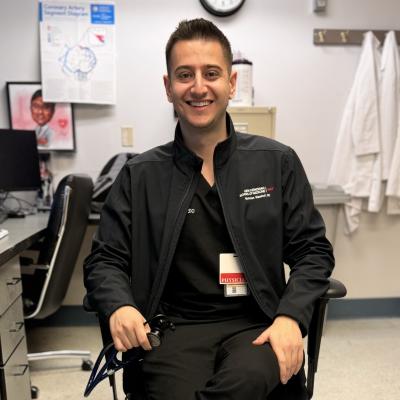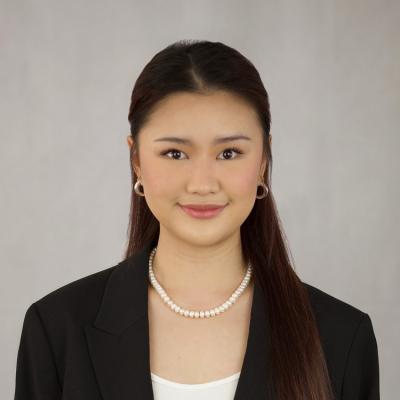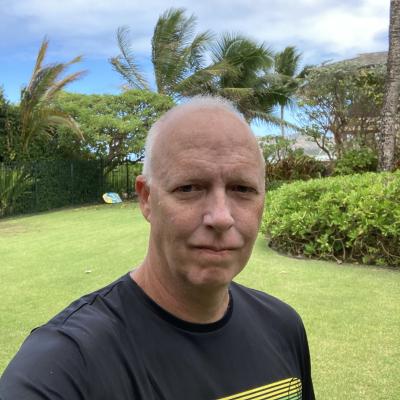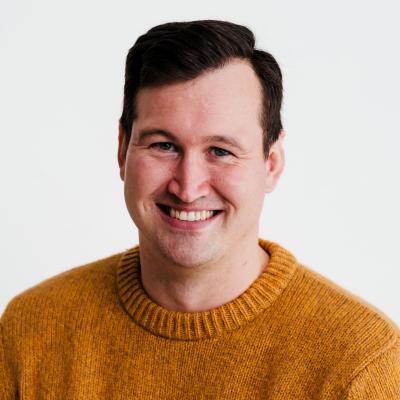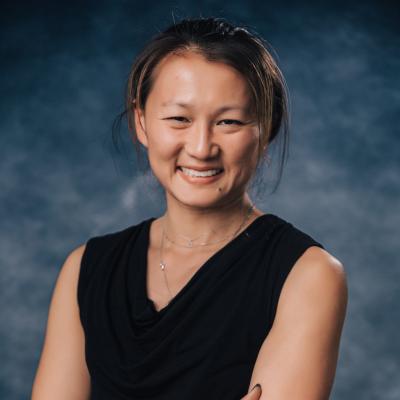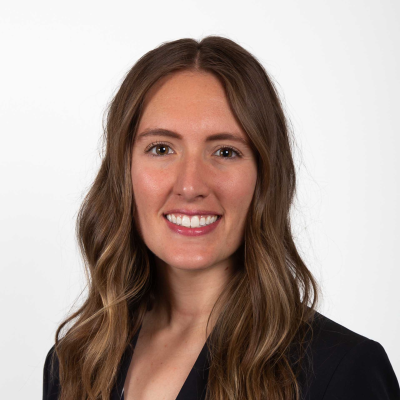SOLS Alumni Highlights: June 2024
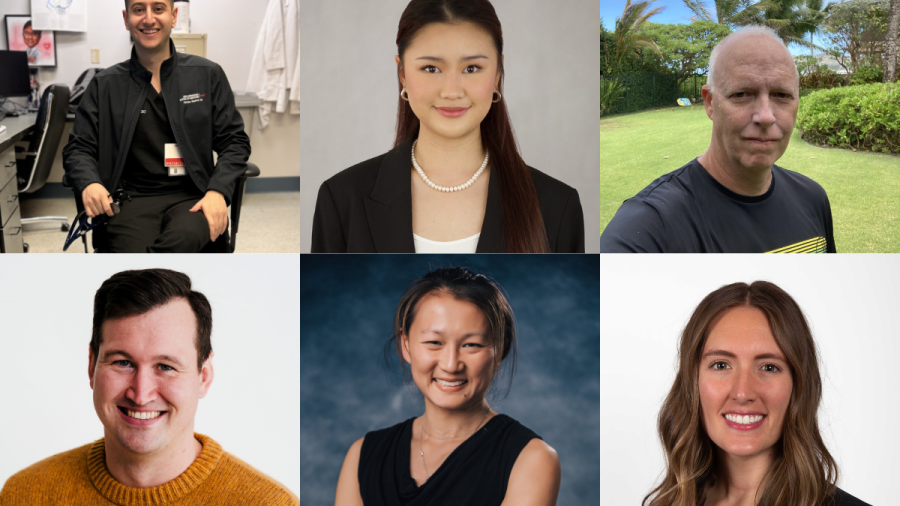
From top left to bottom right, this month's featured alumni are Nicholas Maalouf, Win ‘Victoria’ Aung, Shade Shutters, Owen McKenna, Katie Surrey, and Michelle Govani
This article is part of a series of profiles for SOLS alumni stories. In this month's edition, we cover 6 alumni including recent graduates and alumni who were at SOLS when it first began 20 years ago. Read part 1 here
Nicholas Maalouf - Class of 2017
After graduating from high school, Nicholas Maalouf wanted to be close to his family and home in Mesa, Arizona. Since his father attended ASU’s engineering school in the early 1980s, Maalouf felt that attending ASU would allow him to stay close to home and rely on his familiarity with the school. While he initially felt overwhelmed by the number of people at the university, Maalouf began to form close bonds with classmates at orientation and student events during the beginning of his first semester.
Within the School of Life Sciences, Maalouf found many opportunities to join a close-knit community and take leadership roles in student organizations. Maalouf joined SOLS Ambassadors, a dedicated group of life sciences students who host events and activities for students to bond with and support each other. He eventually became a co-director of the program and tutored basic sciences to other students for 10-15 hours a week. Additionally, Maalouf taught a freshmen seminar class, helping first-year students settle into their environment at ASU, and teaching them the fundamental steps they would need to be successful in SOLS.
Forming close friendships and mentorships with faculty was also extremely important to Maalouf during his time at SOLS. One of his favorite classes included a medical bacteriology class taught by Professor Shelley Haydel. Another favorite professor of Maalouf was Michael Angilletta, who taught a very engaging intro class that was Maalouf’s first experience in a wet lab. During the final years of his undergraduate degree, Maalouf’s honors thesis project and his capstone project studied how student tutoring and mentorship impact the learning experience of undergraduate students in BIO 281 and 283. This experience helped culminate his connections with faculty and prepare him for medical school.
After graduating from ASU, Maalouf attended medical school at the West Virginia School of Osteopathic Medicine, which put his time-management skills and knowledge to the test. According to Maalouf, he felt that his bachelor’s degree in medical microbiology and his experience at SOLS sufficiently prepared him to take on the challenges of medical school, and helped him network with others in his field. Now, Maalouf is a medical resident at the Department of Internal Medicine at the University of Nevada, Las Vegas.
When asked what he was most proud of from his time at SOLS, Maalouf said he was very proud of completing his honors thesis, seeing his hard work pay off during his undergraduate experience, and achieving a 4.0 GPA for all four years. Maalouf also had this to say for current students in college, “Remember to take things day-by-day. College can be so stressful with big projects, making new friends, and transitioning into adult life. Taking things one step at a time and setting time for your mental health is so important. I’d also say that college isn’t just about the degree, it’s about the people you surround yourself with and building your network that will continue well after you graduate.”
Win ‘Victoria’ Aung - Class of 2018
As an international student from Burma, Win Aung found ASU to be a unique experience where different cultures are represented. While Aung found ASU’s large student population to be intimidating at first, her impression of the university improved over time and she thought it was interesting how the culture of an American university was more extroverted than she expected. The number of students from across the world on ASU’s campus helped form a diverse student body according to Aung, and she met people from so many different backgrounds.
One of the professors from SOLS who made a big impact on Aung’s experience is Dr. Hong Lei, who offered Aung a research position in the field of insect research. During her research experience, Aung had the opportunity to catch and freeze bees, which she would then dissect, probe, and record their senses including smell. She also had the opportunity to work the night shift at HonorHealth, her first working experience in an American hospital. This experience was especially helpful for Aung since her goal was to attend medical school. “I feel like ASU and SOLS really helped me learn how I should manage my studying, especially since I would go on to attend medical school. In that position, you really learn how to become more independent and teach yourself how to learn the material more effectively.”
When asked what she was most proud of from her time at ASU and SOLS, Aung said that she was most proud of the different research opportunities she got to be a part of, being able to present her findings to others at the SOLUR research symposium, and being able to find so many opportunities across the university. After graduating with a degree in biological sciences and a minor in business, Aung went on to attend the Ross University School of Medicine and has taken a residency position in Minnesota.
Aung said her biggest advice to current college students is “Don’t be afraid to try new things and experiences. Your activities and life outside of school matter, and you’ll see how fun being a college student is if you enjoy things in the moment. I definitely think it’s also important to build a lot of connections with the people around you in college. Joining clubs was so beneficial for me and definitely helped me feel more confident about going to medical school after I graduated.”
Shade Shutters - Class of 2009
After working in business and finance for over a decade, Shade Shutters knew he wanted to do something unique with his PhD research. While economists and ecologists may appear to study two very different subjects, Shutters believed there were commonalities between the two that he wanted to study further. Specifically, Shutters wanted to study Complexity, the scientific theory asserting that some systems display behavioral phenomena completely inexplicable by conventional analyses of the systems’ constituent parts.
When interviewing potential mentors and PhD advisors, Shutters found Professor Ann Kinzig to be a very inspirational faculty member who would give him the flexibility to study how the principles of biology and ecology research could be applied in urban settings to study why industries and businesses have certain patterns in their geographic locations and their behaviors. Shutters began the next step of his education as a non-degree graduate student in the Fall of 2002, just as the AZ Board of Regents and ASU approved a proposal to create a new School of Life Sciences, which would incorporate three academic departments including biology, plant biology, and microbiology. When SOLS began operation in July 2003, Shutters was excited to take his PhD in a unique direction with interdisciplinary collaborations and research with students from both the natural sciences and social sciences.
These research collaborations allowed Shutters to also directly interact with stakeholders in his research to learn what urban planners and economic developers struggle with on a daily basis, and how certain scientific disciplines including biology could support these stakeholders in their day-to-day activities. According to Shutters, his PhD studies allowed him to conduct research in a solution-oriented manner that would directly make an impact on his community through non-traditional research. “Seeing the research that biologists do on animals like insects and their behavior, you can sort of connect the dots between that methodology and the way urban planners look at the economic development of cities and urban areas,” said Shutters.
Before graduating with a PhD, Shutters received an offer for a postdoctoral research position at the University of Vigo’s Department of Applied Economics and he also became a Core Faculty member at the Center for Social Dynamics and Complexity at ASU. Today, Shutters is a Research Scientist in ASU’s School of Complex Adaptive Systems. He is also the Director of Economic Transformations at ASU’s Decision Theater where he works with his team to build support tools to help policymakers navigate the difficulties of transforming urban and regional economies. When asked what his advice is to current students and alumni from SOLS, Shutters said “Don’t discount nonacademic jobs or nontraditional academic jobs. I found a specific niche where I became fulfilled and flexible, so I think it’s important for any college graduate to be flexible and find ways to make a job their own. I also think data skills are so important now for graduates since having experience with data analysis can be applied to any job in academia or industry. There are so many opportunities for graduates in nontraditional academic roles and I hope I can be an example of that with my experience from SOLS.”
Owen McKenna - Class of 2016
As an undergraduate student at Loyola Chicago, Owen McKenna was involved in several research initiatives that further fueled his passion for environmental life science. When deciding where he wanted to attend graduate school, McKenna knew he wanted to attend a large research university in the West. One area of research he was especially interested in was how wetlands ecosystems function.
After discussing research opportunities with his undergraduate advisor, McKenna contacted Nancy Grimm, an ecosystem ecologist and regents professor at SOLS. Grimm introduced McKenna to Osvaldo Sala, founding director of the ASU Global Drylands Center who was recruiting grad students. Sala was impressed with McKenna’s past publications he wrote as an undergraduate and his ability to take on new research projects in the field. During his experience at the Sala Lab, McKenna would go on to conduct field research at the Jornada Experimental Range where he studied desert biomes, wetland environments, and the relationship between these environments and climate change.
One important aspect of the Sala lab McKenna discussed was that Sala did not try to shape his students into a mold of himself, but rather he taught the important foundations of environmental sciences and allowed students to embrace different areas that they were most passionate about. McKenna also shared that one of the most valuable experiences he had during his graduate education at SOLS was that he wrote many funding proposals for research projects. While several of these proposals were rejected, he felt that the experience helped him write his own ideas, do thorough research on environmental topics, read high-level research papers, and manage funding proposals in his career after graduating with his PhD.
When asked what his favorite parts of his education at ASU were, McKenna said that his cohort in environmental life sciences was very important to his experience. “I’m still friends with a lot of the people from my cohort and others from SOLS to this day so I think forming that close-knit community was definitely rewarding. Especially as graduate students, you form a close bond with each other not only in your work but also just having fun like going out for happy hour or tubing down the Salt River.”
McKenna also shared how his mindset changed throughout his graduate education saying “Originally I really thought your graduate education and PhD was trying to mold you into becoming a professor and joining academia. But then I saw the different pathways you can take with your education especially if you have great mentors like I did who are open to working with you to find your niche. I’m really happy with the career I’ve been able to make for myself as an ecologist working with USGS.”
Today, McKenna is a research ecologist at the US Geological Survey, where he is stationed at the Northern Prairie Wildlife Research Center in North Dakota. His work includes many activities that carry over similar principles from his PhD including his past research on wetlands, finding how climate change is affecting the ecosystem at the research center, and now looking at the conservation of lands that ducks use as they migrate in North America. When asked what his advice is to current students and recent graduates, McKenna said “I think you should definitely try to get a good sense of how your academic advisors can help you and what resources the school has to support you. I also think it’s important to be open to unexpected connections and to stay optimistic if you start to have doubts about what you’re studying or going into for a career. Having that support network from college and onward is going to be really helpful to take care of your mental health and remember that you always still have time to change your career focus if you want to.”
Katie Surrey - Class of 2023
As a graduate of Connecticut College in 2014 with a degree in Environmental Science, Katie Surrey knew she wanted to work in a field that protected the environment and animals. While she didn’t originally have plans to attend graduate school, she was very passionate about doing meaningful work and research with people to make a positive impact on the world around her. While working in different jobs in the field of animal care, Surrey looked into graduate school programs that would give her more perspective into the bigger picture of animal conservation. During this search, Surrey met Leah Gerber, Founding Director of the Center for Biodiversity Outcomes who would become her advisor. Surrey was drawn to the interdisciplinary elements of both CBO and SOLS which give students not only the scientific point of view of subjects, but also teaches them how societal contexts influence the life sciences.
While pursuing her PhD in conservation and animal behavior, Surrey felt that the skills she gained were essential for any aspiring scientist. When asked how others can apply research skills in the field, Surrey said, “There’s always more to question and learn as researchers. I think anyone interested in doing research needs to always have the curiosity to explore what’s in front of them, double-check what perspectives exist outside their own, find the overlooked stories in the field, and elevate other perspectives so they can get a better understanding of what (and why) they’re researching.”
Another aspect of her PhD education that Surrey enjoyed was the freedom to take chances on new ideas and explore many opportunities for problem-solving. “I think a lot of professors in SOLS are very optimistic in that everything you do as a student is an opportunity. Leah would have what felt like a million ideas in her head and it was great to throw ideas at the wall and see which ones would stick. It felt like a much more creative environment, where you can take that approach instead of only talking about ideas - when instead you could be out in the field and trying them out,” said Surrey.
Surrey also shared that SOLS felt like a very close-knit community to her because of the many opportunities to meet other passionate students in seminars and other events where she made lasting friendships. “I think the way everyone had their form of unique thinking was emblematic in their hard work and it showcased how willing all of the students were to take different actions to solve problems,” said Surrey on the different mindsets students had at SOLS. Outside of purely academic activities, Surrey also volunteered at a therapeutic horseback center where she felt like she was making a difference in her community, and that it was a good way to stay grounded outside of school work.
When asked what her biggest piece of advice is to current students and alumni, Surrey said “Try to stay open-minded to new opportunities and give yourself the chance to try them. I think a single-track career is really difficult to have in our rapidly changing world so your job position (and interests) after college can change so quickly. You’re not married to any single job so even if an opportunity doesn’t work out, at least you can learn from that experience. Scientists especially need to think about what impact they want to make on others. We need to be focused on how we apply what we’re learning and how it will contribute to the world. For example: you don’t need to solve climate change overnight but it’s important to take the work you’re doing and show why it matters to other people.” Now as a species and ecosystem scientist at EPRI (the Electric Power Research Institute), Surrey is applying her skills and expertise to guide research in the energy industry on environmentally conscious development and the protection of endangered species.
Michelle Govani - Class of 2019
Michelle Govani is currently the Executive Director of Development of the Moonshot Accelerator and leads science philanthropy efforts at ASU, where she is creating more opportunities for science and technology to contribute to positive social and environmental outcomes. Before entering into her current role at the accelerator, Govani also attended ASU and SOLS as part of the Biology and Society program for her Master’s degree and PhD.
During her time in SOLS and the Center for Biology Society, Govani was especially interested in the social aspects of science, including philosophy, ethics, economics, and other factors that impact scientific study. One aspect that Govani found to be a great opportunity during her studies was meeting faculty and students from different disciplines. “The faculty around me were so warm and welcoming towards students. My office was on the same level as other scientists studying evolutionary biology and other fascinating subjects so I had the chance to learn in an environment where I could learn from people from so many different backgrounds,” said Govani.
Govani also worked with ASU President Michael Crow early on during her graduate education as a TA in his class. This experience shaped her interest in higher education institutions and the important role of universities in making scientific discoveries. Govani’s dissertation focused on the National Park Service and its actions to overcome challenges including climate change, shifting demographics, overcrowding of parks, land use problems, and fire threats. As part of her dissertation, Govani told the stories of the people she interviewed and the places she visited to make the dissertation feel more human and in touch with people’s attachments to parks across the country. “I felt that my advisor gave me a lot of autonomy to decide my dissertation topic and they weren’t afraid of the ambiguity in some of the topics I covered in that project. SOLS and ASU helped me feel comfortable in building my way forward not only in my education but also my career afterward,” said Govani in her dissertation and the environment within SOLS.
When asked what her biggest piece of advice is to current students or SOLS alumni, Govani said, “Trust the journey you’re on and don’t think that there is any one right pathway. Trust that you’re taking the right next step and the rest will figure it out as you go. At ASU you learn how to become a broad thinker and work with multidisciplinary teams which is so important for a career after graduation. I found my experience at SOLS to be really fundamental for my career in education after my PhD so I think any student and alumni who dedicates themselves to work with open-minded peers will find success.”
In her current role at ASU, Govani continues to apply the knowledge and skills from her time at SOLS by leading cohort programs of up to ten teams where faculty and staff learn concepts and skills relevant to funding models, organizational models, and what a fundable idea looks like. Govani also designs investment opportunities for faculty to build larger labs, centers, and research programs in areas of impact.
